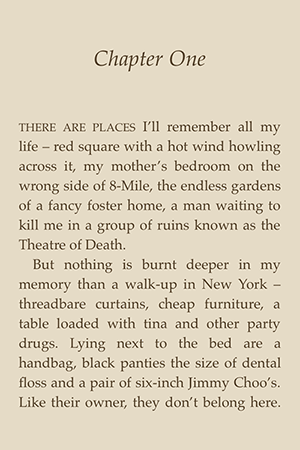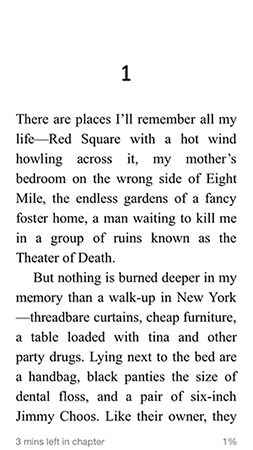Posts Tagged ‘ebooks’
I Am Copy Editor
October 14th, 2014by Gwyn Headley
Managing Director
Tags: American, copy editor, e-books, ebooks, English, I Am Pilgrim, Terry Hayes
During the Frankfurt Book Fair, just past, my bedtime reading was an ebook, a thriller recommended to me by Yvonne: I Am Pilgrim by Terry Hayes, whose name, bafflingly, does not appear on the cover. It’s a rollicking and undemanding read, so I recommended it to my friend and travelling companion Mike Shatzkin, who immediately bought and downloaded it.
I had been complaining of the poor editing quality of most ebooks — the Copy Editor, diligently scanning for literals, is now an extinct species in the wild — and I Am Pilgrim hits you in the first line, with a Beatles quote and a mistake:
“THERE ARE PLACES I’ll remember all my life — red square with a hot wind howling across it …”
Such a shame that people don’t seem to be bothered any more. If you know enough about style to start a chapter with the first three words in small caps, then surely you’ll know that ‘red square’ should be ‘Red Square’ — and your copy editor should be on to it like a vat of hot metal.
Mike’s version was published by Emily Bestler Books, an imprint of Simon & Schuster, whereas my British version was published by Transworld, owned by Penguin Random House. Entirely separate companies, one in America, one in the UK.
Nevertheless the fact that they didn’t exchange digital files for the ebook and each created their version from scratch somewhat surprises me. “Keep the change” is not a frequent phrase in my vocabulary, but this seems like a wanton waste of money.
Mike said “What’s the problem with Red Square? It looks OK to me.” And in his version — the American edition — it was.
The troubling thing for me is that the American typesetting is more correct than the British version. Here they are, so you can compare them:
BRITISH vs AMERICAN
Chapter One vs 1
FIRST THREE WORDS in small caps vs First three words in U/LC
space dash space vs em-dash
red square vs Red Square
8-Mile vs Eight Mile
Theatre vs Theater
burnt vs burned
Choo’s vs Choos
and I’m sure there will be examples on every page, but you get the drift.
Two nations separated by a common language, indeed.
The Power Of The Word
April 19th, 2013by Gwyn Headley
Managing Director
Coming down and calming down from two hectic days at the London Book Fair, I’m sitting in our Harlech office looking out at the waves and the wind and the sunshine, and contemplating the immense power of books.
There’s no doubt the publishing world is in turmoil, with fewer people buying books, ebooks taking an ever larger slice of the pie, bookshops closing every week and a general air of uncertainty hanging over everything. This of course adds to the excitement, and there is, as always in publishing, this sense of ambiguity — are we in the right business? Should we be looking forward? Or over our shoulders?
Two companies expressed an interest, however veiled, in acquiring fotoLibra. Of course there’s a world of difference between acquiring and buying, but it’s interesting to see that some firms are discreetly expanding, and not necessarily in their core disciplines. I should add that these are the first signals of this type we’ve seen in nine years. Flattering, I guess.
To get an indication of the measure of hope in the business, I posed a theoretical question: “If you personally had fifty thousand to invest, would you put it in a firm making printing machinery or a firm making screens?” No one answered directly. Everyone nodded slowly.
There is a rearguard action. At the fair advertising king Maurice Saatchi launched his Books Are My Bag campaign, claimed to be the biggest ever promotion of bookshops. Who doesn’t love a bookshop? But we’re all buying online, and condemning them to a slow, lingering death. Asked to name my favourite bookshop, I hesitated — there used to be two in Crouch End, now there are none.
It’s not because everyone is buying ebooks. An ebook is still a book; it’s just presented differently. And the only ebooks that are selling are fiction. Illustrated ebooks, as we have found out to our cost, are hard to shift. Heritage Ebooks, which we launched with great hope and wonderful images from fotoLibra photographers, has struggled to find a market. We did a deal with The Folly Fellowship, an organisation concerned with the history and preservation of this curious aspect of Britain’s architectural heritage, to give their members a thumping great discount on the purchase of any of our forty Follies of England ebook titles. How many folly enthusiasts took up the offer? None. Not one. Zilch. That is disheartening.
But The Guardian tells me they’re now doing a feature on our Heritage Ebooks, illustrating ten of our ebook covers. That would be nice. I’ll believe it when I see it. BREAKING NEWS: They’re not doing it. Our ebook covers are Portrait format, and they said they needed Landscape. The covers have lettering on them — the book titles, actually — and they wanted them without lettering. It turns out what they really wanted was ten free photographs of follies.
Despite all this doom and gloom, the London Book Fair was humming. Large companies had dozens of tables, each one with four people talking intently with heads bowed. Business was being done. Smaller firms were concentrating just as hard. The only oases of quiet were to be found in the Arab quarter: huge, lavish, glittering, empty national stands, as depopulated as the deserts.
I captioned this piece The Power Of The Word. The word has more power to stimulate the imagination than the image, I regret to admit. According to the National Center for Biotechnology Information, “People remember 10% of what they read, 20% of what they hear, 30% of what they see, and 50% of what they see and hear.” But we’re not told what sort of people they asked. These aren’t book people.
Book people feed on words. I’ll give you an example. I’ve known my old pal Mike for over forty years. We haven’t been in touch a lot since he left publishing, but we hooked up last Christmas and resumed normal service. For a Significant Birthday he was planning a tour of Japan. His highlight was going to be queuing outside a bookshop to be the first to buy Haruki Murakami’s new novel. That was, to borrow a phrase from Gilbert Harding, his Sole Purpose of Visit. What power can there be in words to drag a foreigner halfway around the world — literally! — to join (or in Mike’s case, form) a queue outside a Japanese bookshop? I wish I had readers like that. He’s still out there, by the way, and blogging about it as he travels around the country. You can read his adventures here. Oh — and he left book publishing to become a film-maker. Images for words.
So this week was the book fair. fotoLibra’s major source of income is from book publishers. Next week will be the picture buyers’ fair, fotoFringe in King’s Cross. It will be a busy week for us. And there will be some interesting NEWS from fotoLibra.
Contentious VAT On Ebooks
October 28th, 2012by Gwyn Headley
Managing Director
Tags: 3G, accountants, Amazon, American, Apple, bandwidth, Berwin Leighton Paisner, BLP, British publishing industry, broadband, City, clients, digital publishing, drive prices down, ebooks, Europe, fiscal neutrality, Foyles, gilt-edged, Government, greater good, Heritage Ebooks, HMRC, illustrated ebooks, KFC, law, lawyers, losing, Luxembourg, Macdonalds, photographers, picture libraries, Printed books, pro bono, Publishers, raise prices, standard-rated, Starbucks, tax, Tesco, UK, VAT, Waterstones, zero-rated
Printed books are zero-rated for VAT in the UK. Ebooks are taxed at 20%.
Publishers have taken a softly-softly approach to VAT on ebooks, fearful that if they kick up too much of a fuss the Government will awaken to the fact that printed books are presently zero-rated and slap 20% on them overnight.
Such a move would decimate the British publishing industry — and by extension picture libraries, photographers and all the industry’s ancillary suppliers would take a huge hit. It’s therefore unlikely to happen, but who can predict what a politician may take into his head to do.
City law firm Berwin Leighton Paisner has announced on its website:
“VAT treatment of ebooks – The firm is taking a groundbreaking case challenging HMRC’s view that ebooks are standard-rated for VAT purposes, in contrast with physical books which are zero-rated.”
Hard-nosed commercial firms like BLP do not take cases on pro bono, or challenge national or international law simply for the greater good. Therefore they’re doing this for one of their clients, and that client will have deep, deep pockets.
Who can it be? Who will benefit?
Well, the consumer will benefit if prices fall by 20% (they won’t). Publishers will benefit from a boost in sales.
But by far the biggest beneficiaries will be the retailers. Apple sells ebooks. Tesco sells ebooks. They will both see a hike in profits. BLP numbers Apple and Tesco among its gilt-edged list of clients.
Our digital publishing company Heritage Ebooks sells 50 illustrated ebooks from its site for every one ebook sold by the rest of the UK’s ebook sales outlets — Waterstones, Foyles, Tescos and so on — put together.
And for every one of our ebooks that we sell from our site, Amazon will sell twelve from theirs.
It is disproportionately huge. OK, so we’re tiddlers, microbes even, but I expect the proportions are similar whatever you publish.
Amazon has been subject to much opprobrium and contumely for selling ebooks to UK customers and charging the full 20% VAT while taking advantage of the 3% VAT they pay as a company based in Luxembourg. Like Starbucks, Macdonalds and KFC, large American companies have an aversion to paying their fair share of tax in Europe, and as their lawyers and accountants are sharper than ours, they can get away with it.
And now some organisation, through BLP, is challenging HMRC’s ruling on the grounds that charging different rates of VAT on print books and ebooks breaches EU law on fiscal neutrality.
Come on, this has to be Amazon. Who else could afford such a suit? And who else would profit more?
Amazon charge us, the publisher, for the bandwidth used when a customer buys and downloads a Heritage Ebook from them. Because our ebooks are highly illustrated, they have large filesizes and therefore incur high bandwidth usage fees. And because one or two books are downloaded via 3G rather than broadband, Amazon charges us across the board at mobile phone companies’ bandwidth fees.
The result is that for two of our titles, we are losing 10p on every sale made through Amazon because of their charges. Amazon are thereby forcing us to raise our prices.
And I thought their intention was to drive prices down.
Consumables, Landfill, Heirlooms
June 25th, 2012subtitled CONTENT vs DEVICES
I wish I knew what it was about the human condition that makes people like me pant after shiny things, wide aperture lenses and items with plugs.
Take ebooks. The Kindle is easily the market leader, but there are people who swear by Nook or Kobo, or who would only read ebooks on an iPad.
Now imagine that you had to make the decision that you would only read books printed by collotype. Or gravure. Or having a sulk because your partner prefers letterpress to litho.
It’s irrelevant. You know it is. I know it is. It’s the same with cameras. Once the short, bloody war between film and digital had been comprehensively won, the same old rivalry continued between the Nikon and Canon camps.
It. Doesn’t. Matter.
You can read Hilary Mantel’s Bring Up The Bodies as a book, on a Kindle, on a Nook, on an iPad, on your Android ’phone if you will.
You can admire a Colin Macpherson photograph in print, on your laptop or on your iPhone.
It. Doesn’t. Matter.
It’s whatever you feel most comfortable with. The tools used to create and convey the work are unimportant. What matters is the mind and eye that controls that tool. It’s the brain that creates the content, whether it be Wolf Hall or an Ansel Adams print.
Some artists fall in love with their tools (OK, I could have phrased that more elegantly) like Douglas Adams, who obsessed about his Apple Macs. Others will write with whatever comes to hand (this gets worse). The creator will use whatever he or she is most comfortable with, and it should be the same for the consumer. Don’t feel pressured into abandoning printed books if that’s what you like best. I’m not going to recommend reverting to film cameras, however, because whatever happens you will have to digitise that image at some point. It may as well be born digital. But how will you bear to be reading a book on an iPad One when the 12-year-old sitting next to you on the tube is perusing an iPad Three?
The device is important of course, but the method of delivery is far less important than the actual content. It is infinitely more agreeable to get to the Frankfurt Book Fair by Rolls-Royce than by bus — but the important bit is getting to Frankfurt.
When you finish A La Recherche du Temps Perdu people aren’t going to ask you whether you read it in hardback, paperback or as an ebook, though they may ask if you read it in French or in translation. When you eat a meal, you needn’t ask the cook what oven she uses, especially if you plan on using teeth to eat with in the future. Why then do people say “Lovely photograph. What camera do you use?”
It. Doesn’t. Matter.
Everything you and I buy can be placed in one of three categories:
Consumables: e.g. Food. I eat it. I buy more. Clothes. I wear them. I wear them out.
Landfill: e.g. anything with a plug. If such a remarkable device as an iPad had existed in 1979 when I bought my Mont Blanc pen for £30, it might have cost a million pounds. Today they both cost about £500. In ten years’ time my pen will be worth about £750 and I will have thrown away my iPad. All the ebooks I bought will probably be irretrievable.
Heirlooms: e.g. my pen. I write with it. I will write with it for the next 20 years. Then I will leave it to a niece. It will always be worth more than I paid for it. And the leather bound copy of Follies will be on my bookshelf when I am cold and dry.
The memories of the marvellous books I have read and the wonderful photographs I have seen will stay with me long after the tools that produced them have been consigned to the scrap heap.
Heirlooms.
Content.
Another Wonderful eBook?
August 31st, 2010by Gwyn Headley
Managing Director
Readers may recall the troubles I’ve recently had with an enhanced ebook: The Guide to Birds of Britain and Europe.
Ever the early adopter, I rushed out and plonked my money down when the immortal Oxford English Dictionary was first published electronically in 1993. We didn’t use the word ebook back then.
It was merely called “The Oxford English Dictionary on Compact Disc”, and it came in a chunky A4 sized white plastic box. This was considerably smaller and lighter than the 16 volumes of the printed work, and of course somewhat cheaper, as well.
Inside the plastic box came a printed instruction manual, a floppy disk which contained the program and the necessary fonts, and a CD-ROM which held the data.
I can’t use it any more because it only runs on Mac OS 7, 8 and 9, and I no longer have a computer that uses those operating systems. Or a floppy disk drive.
But all is not lost. In June last year I had a cheery letter from Oxford University Press offering me, as a registered user of Version 1.0d, the Oxford English Dictionary 2nd ed — new Mac-compatible CD-ROM v4.0 on a Special Offer!
For a mere £149.25 more I would be able to read my version of the OED on a more up-to-date computer.
Of course for the same amount of money I could buy all 16 volumes second-hand from Abe Books.
And I wouldn’t have to chuck it away when Apple finally release Mac OS XI.
But now OUP have announced that the next edition of the OED may well be available only as an ebook — no print edition at all. So we’re moving to a situation where we will have to pay out regularly for upgrades to carry on using a necessary reference work.
It’s what the software and publishing giants have dreamed of. Books that expire after a certain time. After all, who is still using Photoshop I nowadays?
eBook Pricing
February 15th, 2010by Gwyn Headley
Managing Director
I needed to brush up on my SEO (Search Engine Optimisation) awareness so I thought I’d buy an ebook on the subject, instead of waiting around for the print version to arrive.
Because if anything’s got a short shelf life it’s going to be a book about how to improve your web site.
As I’m a member of a thriving LinkedIn community called “Ebooks, Ebook Readers, Digital Books and Digital Content Publishing” I thought I’d solicit the help of my fellow members and so I asked them “Can anyone recommend a good ebook about SEO? ANY ebook on SEO seems to be hard to find.”
They responded generously. I chose “SEO Warrior” by John Jerkowicz, for two reasons: it was the most recently published book on the subject (see comment above about short shelf lives) and it was published by O’Reilly, a trusted name in computer publishing.
It was suggested by Jill Tomich, the CEO of eBookPie, together with a link through to the page on her site where I could buy it: http://bit.ly/bLhQ7F. This was great. Just what I wanted. It was only $30.69.
But something made me pause. When I got my iPhone, I bought the O’Reilly “Missing Manual for the iPhone”. And it cost me £2.99. So I went to the iTunes store and found 600+ O’Reilly titles ranging from free (free is a price point) to £3.49. And there was “SEO Warrior” for £2.99.
Reader, I bought it.
Now everyone knows that O’Reilly are smart guys. Perhaps they can explain to me the following price structure for “SEO Warrior”:
Recommended retail price, USA:$44.99, UK £34.50
Print copy, Amazon USA: $29.69
Print copy, Amazon UK: £18.41
eBook, eBookPie USA: $30.69
eBook, iTunes App Store UK: £2.99
As an App developer myself (Aaron’s Time Machine: New York will very shortly be released) I know that Apple take 30% from the sale of any app. So what’s the thinking behind O’Reilly selling the same product (OK, in different formats) at prices ranging between $44.99 and $4.69? A near tenfold difference? How does the author feel about his royalty?
Please tell me. I’m really curious.
Yes, I feel bad about not buying it from Jill Tomich’s site, as she was so kind as to point me to it. But not as bad as I’d have felt if I’d paid $30 for the ebook and an hour later found it being sold for £3.
Kindle for the iPhone
January 13th, 2010Amazon announced a Kindle app for the iPhone a while ago; I’ve just got round to downloading it.
Now I’m a fan of ebooks. It’s a great concept, and therein lies the future — but I still have reservations. I don’t think there will be a tipping point from print to ebooks any time soon.
It won’t happen as quickly as many gurus hope it will, because
1. New ebook readers are announced daily. One format must achieve dominance, by which I mean 80%+ of the market.
2. That format has to do everything: colour, sound, movies, the lot
3. They are furiously expensive
4. We’re not there yet
Amazon famously announced that on Christmas Day more ebooks were downloaded than than they sold printed books. The future had arrived.
Well, durrr. Who is going to be on line buying books on Christmas Day? And who is more likely to be sitting in their solitary flat with the turkey pizza shoved under the door, endlessly scanning the internet for stuff to download?
Weren’t 8 out of 10 of their top selling ebooks all giveaways? How many of the print titles were free? I think we’ve been handed some spurious statistics here, and it’s been repeated all over the place.
The chatterati WANT ebooks to succeed. And of course they will. But a lot of people have got to get their acts together pretty damn quickly if it’s going to happen any time soon.
What prompted this? Well, I downloaded the Kindle app, and then I downloaded an ebook from Amazon.
And this is what I saw:
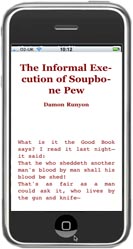
Well, I’m sorry — I gave up right away. There are graphic standards to keep to in this world, and I refuse to dumb down to
THE INFORMAL EXE-
CUTION OF SOUPBO-
NE PEW
which is beyond pathetic as any sort of commercial offering.
Keep trying, chaps. I’m sure you’ll make it eventually.
The ebooks that Neil Smith and I have produced for Aaron’s Apps are attractive, readable, innovative, colourful, non-linear, a new way of presenting a guide book, a new way of presenting history, and (though of course I’m saying all this myself) a genuinely new way of reading a book. These are guide books that follow YOU about, not the other way around. One huge illustration, eight feet by six feet, 160 pages which you can read in any order, and a nifty way to locate yourself in a city 200 years ago, as easily as today. Impossible to replicate in a printed book.
Now THAT’s what I call an ebook. The world should be beating a path to our door.
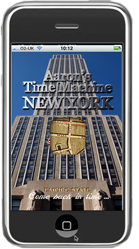
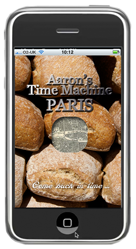
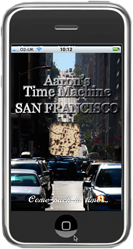
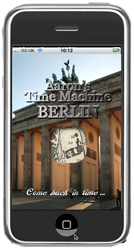
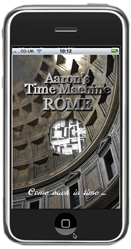
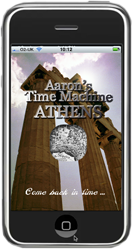
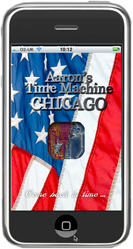
fotoLibra 2009 Pro Blog Index
January 7th, 2010by Gwyn Headley
Managing Director
Tags: Aaron's Apps, Aaron's Time Machine, Adobe, Amazon, Apple, BAPLA, book publishing, books, CS3, CS4, drag and drop, easy upload, ebook, ebooks, Encyclopedia of Fonts, fotoLibra, Google, heritage, iphone, iphone apps, Macintosh, marketing photographs, Microsoft, Model releases, photography, Photoshop, picture library, picture sales, Prices, property releases, rights, selling photographs, selling pictures, stock agency, territories, upload checker, user experience
Here’s an index to the fotoLibra Pro Blog for the whole of 2009.
As I complained 6 months ago, it takes a surprising amount of time to compile, so if there are any WordPress experts out there who know how to automate this process, we’d love to hear from you.
If you’re new to fotoLibra, welcome, and may we suggest you read through the HINTS & TIPS section, and if nothing else read Great Expectations. If you enjoy a bit of controversy, read BAPLA Shock Horror.
Comments are welcome, even on old posts, and will be read and often responded to.
HINTS & TIPS
- Three hundred pixels per inch
- Shots of Redemption
- How To Take Aerial Photographs When You Haven’t Got An Aeroplane
- Compression
- Great Expectations
- RSVP
ABOUT FOTOLIBRA
- New fotoLibra
- BOMBSHELL
- Most Popular Searches
- White Labelling
- A Third of a Million
- Picture Calls
- fotoLibra DND & Checker 2.1 Released
- Drag ‘n’ Drop Upload Checker
- The New Picture Call Tab
- SPQR
- Search Engines and fotoLibra
- Yahoo Blocks Our Emails
- It’s got to be today
- 300,000 up!
ADOBE
BAPLA
CUSTOMERS
E-BOOKS & PUBLISHING
- Free iPhone App: Aaron’s Time Machine: London Lyte!
- Orphan Books
- The Killer eBook Is Nearly Here
- UK Politicians Not Entranced by eBooks
- Primary School Books
- Getting ready for e-books and Graphics
- Kindle 2
- More Kindling
- The Killer Book for e-books
IT
LAW
MISCELLANY
- Winterval
- Reunited
- Prophecies & Prophets
- Unpleasant Comments & Spam
- Proto-foto-Libra
- Cancelled Air Show
- Giving It Away For Free
- A heritage in photography
- Farewell Kodachrome
- The perils of publishing
- Happy New Year
NETWORKING
NEWS
PICTURE CALLS
SECURITY
TRADE FAIRS


